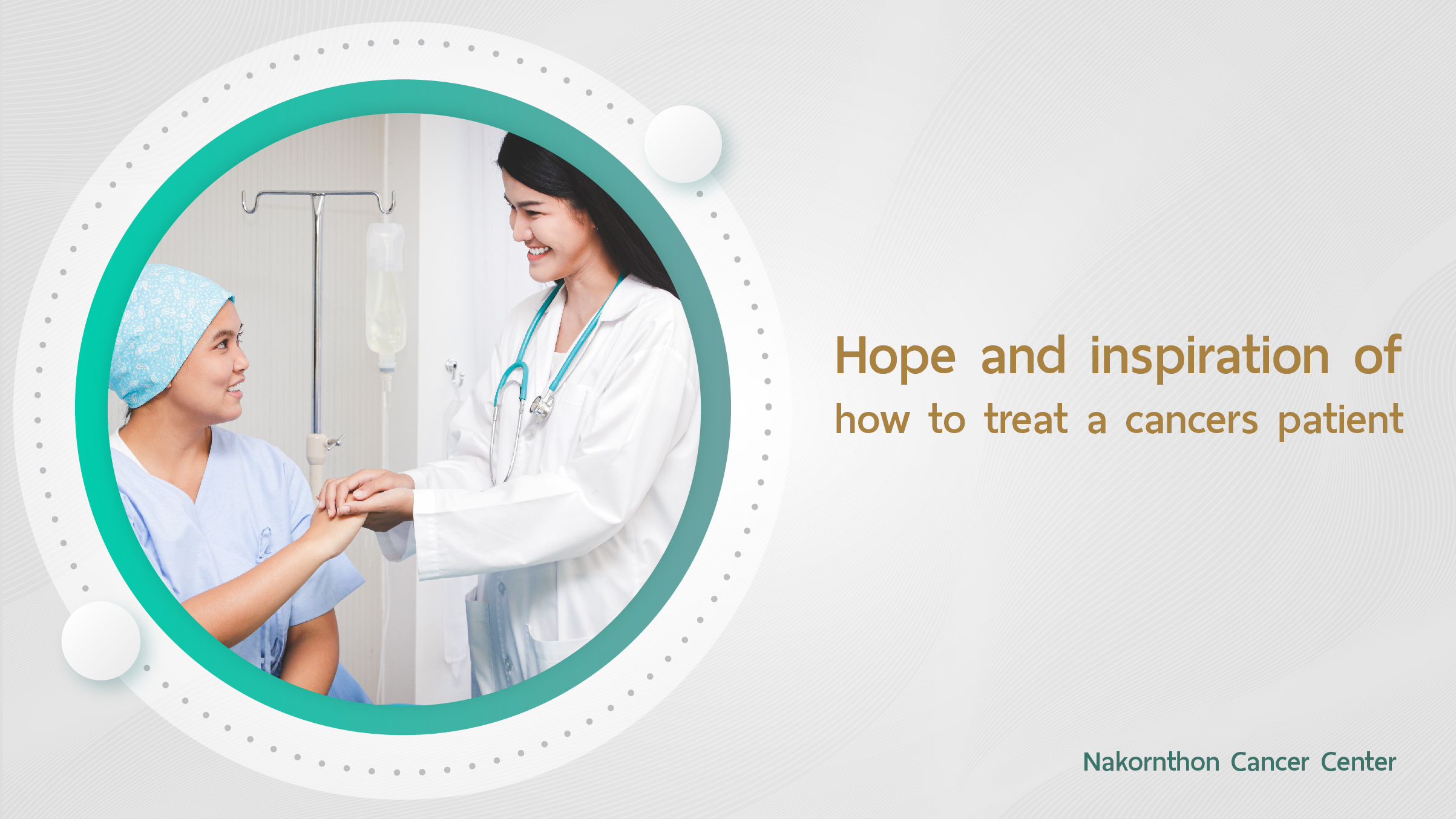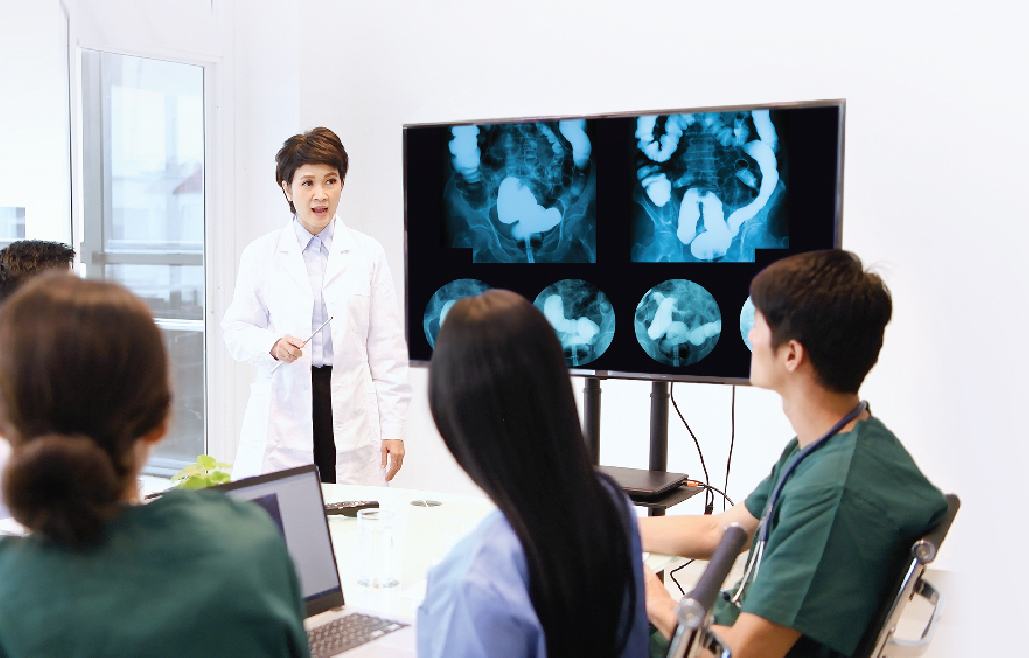Cancer Center

Cancer Center
Cancer Center provides cancer care with a multidisciplinary team consisting of specialized doctor, medical personnel with expertise in cancer. We are ready to be at your services which included of cancer prevention, cancer screening, diagnosis, treatment follow-up, possible complications that might occur along with mental healthcare, nutrition and pain management. We also provide the close monitoring to prevent recurrence.
Common cancer in Thailand:
- Liver Cancer The most common symptoms include fatigue, weight loss, low fever, pain in the right ribcage, lump can be felt on the right ribcage. In the final stages, there may be chronic fever, yellow eyes, jaundice, or some people might have symptoms indicating of liver cirrhosis, such as swollen legs, swollen abdomen, and aneurysms.
- Breast Cancer The most common symptoms include feeling a lump in the breast, fluid discharge on nipple area. If there is blood secretion, it increases the chance of getting cancer even more. The skin on the breast resembles an orange peel or there are dents on the skin or the deformed breast.
- Trachea Bronchus and Lung cancer At the early stages usually has no abnormal symptoms. When the tumor grows and presses on the bronchial tubes or spreads to other organs, symptoms start to appear, including chronic cough, cough with blood, and chest pain, shortness of breath, swollen face, swollen arms, weight loss, loss of appetite.
- Colorectal Cancer Symptoms include abdominal pain and distension similar to gastritis. When it becomes severe, there may be alternating constipation and diarrhea. The nature of bowel movements may change due to intestinal obstruction, such as blood in the stool, anemia, or dark colored stools similar to the color of pig's blood. Alternating between liquid stool and hard stool. Sometimes it's like not finishing the defecating, etc.
- Cervical Cancer/ Uterine Cancer Symptoms unusually found a large amounts of vaginal discharge, abnormal vaginal bleeding, bleeding after sex, Irregular menstruation, menstruation is longer or abnormally heavy. Pain in the lower abdomen for no apparent reason.
- Prostate Cancer Symptoms found include the difficulty in urinating. Must exert force to urinate for a long time, inability to urinate, burning sensation and pain when urinating, like you can't urinate completely, urinating frequently, and in some cases, blood may come out.
- Ovarian Cancer in its early stages often has no symptoms or unclear symptoms such as indigestion, abdominal discomfort and bloating, get easily full after eating. Symptoms that most frequently bring patients to the doctor include bloating and inflammation. This is because there is water in the stomach or the lump is so large that it presses on other organs in the stomach which is a symptom of a disease that has spread (stage 3-4)
"For good results of treatment"
Prevention
Genetics is one of the risk factors for cancer. Genetic cancer examination through laboratory certified standard, can provide accurate results which help analyzed patients who are at high risk of cancer and awareness by providing personalized recommendations for the prevention of cancer in the future, such as personalized follow-up programs, risky organ surgery as an alternative to protect future cancers, etc.
Screening
Nowadays, new innovations in medical technology and medical tools help detect a cancer from the very first stage. Especially in high-risk patients, such as patients with a family history of cancer, history of smoking, etc., so that immediate treatment can be provided, such as
- Breast cancer screening through digital mammography and ultrasound
- Lung cancer screening with low dose CT
- Cervical cancer screening through Pap smearHPV DNA Testing
- Colonoscopy
- Prostate cancer screening by blood test and additional ultrasound or MRI scan if blood results are abnormal.
- Liver cancer screening by blood and ultrasound
Diagnosis & Treatment
Accurate and early diagnosis of cancer makes it possible to treat in on time and achieve positive treatment result. If the stage of the disease is known, using a Tomography, PET-CT this can help make an effective treatment plan. And a biopsy to determine whether or not the biopsy contains cancer cells. The biopsy requires advanced expertise to be accurate and in-depth studies at the molecular level and/or from the blood. This will help treat cancer effectively and appropriately for one’s individual.
Cancer treatment is quite complex which requires a combination of treatments. Nakornthon Hospital offers a Tumor Board meeting consisting of a multidisciplinary team of doctors specializing in cancer such as internists, oncologist and cancer surgeons. Specialists involved, pathologists, radiologists, lab staff and pharmacists. This meeting aims to jointly plan and find the appropriate treatment individually for the best results.
Cancer treatment options
There are many methods of treating cancer today, depending on the type and the severity of the disease, such as
- Chemotherapy or chemo is a cancer treatment medication that acts against or destroys cancer cells which continuously divide fast. The medication works by inhibiting the division of cancer cells in many forms. This causes the cells to be unable to divide further and eventually die.
- Radiation therapy , uses high-energy radiation to destroy cancer cells, each time the light is emitted cancer cells accumulate more and more genetic abnormalities. As a result, they are unable to repair damage from radiation and the cells die.
- Targeted therapy is a medication that has a specific effect on cancer cells, which inhibits signaling related to growth and the division of cancer cells, can control cancer for a longer time and have less side effects on normal cells than chemotherapy.
- Immunotherapy is a medication that treats cancer by inhibiting the immune evasion process of cancer cells and stimulate the body's immune system to eliminate cancer cells more efficiently. It is considered to be using our own body's immune system to fight cancer cells directly.
- Hematopoietic stem cell transplantation or bone marrow transplantation is a treatment for cancer by taking hematopoietic stem cells from sources such as bone marrow, blood, and placental umbilical cord blood. Both from others or one’s self are stored to use in cancer treatment.
- Surgery is a method of treating cancer in a specific area. It has not spread to other nearby organs or has not spread to other organs and be able to control the disease. In addition, surgical techniques are very advanced. The tumor can be surgically removed without organ damage and loss of that organ can be avoided, such as breast-conserving breast cancer surgery. And there is also surgery with small incisions. It has little impact, such as laparoscopic surgery./
Treatment and follow-up
There is regular monitoring and observation. This is to prevent recurrence of the cancer, which may occur after treatment is completed. Moreover, the palliative care is also available for terminally ill cancer patients, by a team of specialized cancer staff who closely monitor both physically and psychologically, such as a cancer internist specialist, nutritionists, specialized nurses who care for cancer patients to alleviate their suffering and improve the quality of life for patients and families.
Online Consultation
Business hours
Open daily Monday-Tuesday, Thursday-Friday from 08.00-17.00 hrs and Wednesday from 08.00-12.00 hrs
Location
Cancer Center Fl.1 (inside Medical Center)
Contact
Tel. 0-2450-9999 ext. 1233
Medical team of Cancer Center
Dr.Kittipong Udomdamrongkul
ศูนย์การแพทย์ : Cancer Center, Internal Medicine Center
ความชำนาญพิเศษ : Medical Oncology
Dr.Kanit Ounchokdee
ศูนย์การแพทย์ : Internal Medicine Center, Cancer Center
ความชำนาญพิเศษ : Internal Medicine/Medical Oncology
Dr.Somchai Limpakarn
ศูนย์การแพทย์ : Internal Medicine Center, Cancer Center
ความชำนาญพิเศษ : Medical Oncology/Adult Hematology
Article







